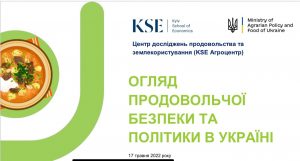Experts from the Center for Food and Land Use Research (KSE Agrocenter) and the Ministry of Agrarian Policy of Ukraine launched the Review of Food Security and Policy of Ukraine. Regular monitoring of food security and agricultural policy in wartime in Ukraine should help sector stakeholders and other stakeholders in making political and business decisions, experts say. This was reported by Ministry of Agrarian Policy.
Огляд відбувався за такими напрямами
GLOBAL VIEW
The blocked exports and the endangered current sowing campaign have led to a sharp rise in world market prices, creating not only risks of undermining the country’s agri-food sector and the national economy as a whole, but also starving hundreds of millions around the world.
INSIDE VIEW
Agriculture accounts for about 20% of Ukraine’s GDP and more than 40% of total export earnings. Farmers provide the local population with almost 100% of the consumption of basic crops, vegetables and at least 80% of meat consumption.
FOOD AVAILABILITY
Prior to the invasion, the Food Availability Index was 12.4, which meant that the average person could buy food for 12.4 months. The current rate is 7.7, which means a decrease in the purchasing power of the average consumer in Ukraine by 37.9%.
FOOD PRICES
The main reasons for the rise in prices were rising world prices for food and energy, caused, among other things, by large-scale infrastructure damage, increased logistics costs, disruptions in operations and supplies in Ukraine.
AGRICULTURAL AND LAND POLICY
Important changes have been made to Ukraine’s agri-food policy in response to the problems posed by the Russian invasion. They are valid for wartime and apply to small and medium-sized farmers.
On April 7, changes took place in the legislation on agricultural land in force during the war. The main change concerns the lease of agricultural lands of state and communal ownership (except for lands that are in permanent use of persons who do not belong to state, municipal enterprises, institutions, organizations), as well as lands that remain in collective ownership of collective agricultural enterprises, agricultural cooperatives , agricultural joint-stock company, unallocated and unclaimed land plots and land plots (shares) for the purposes of agricultural production for up to one year.
The project is supported by the Food and Agriculture Organization of the United Nations, the World Bank and the EBRD.









